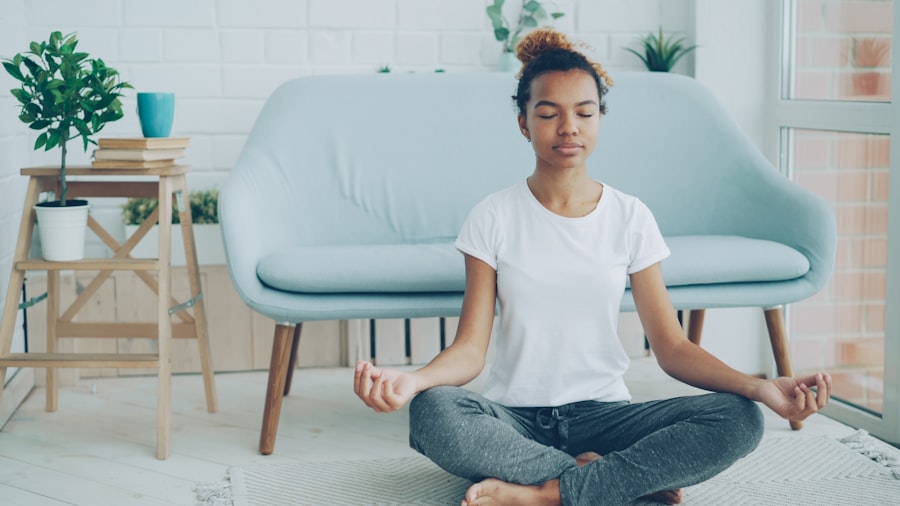In a world that often feels chaotic and overwhelming, the promise of inner peace through meditation is a beacon of hope for many. You may have heard countless stories of individuals who have transformed their lives through the simple act of sitting quietly and turning their attention inward. The allure of meditation lies in its potential to cultivate a sense of calm, clarity, and connection to oneself.
As you embark on your own journey into meditation, you might envision a serene landscape where stress dissipates, and tranquility reigns supreme. However, the path to achieving this inner sanctuary is not always as straightforward as it seems. While meditation is often heralded as a remedy for anxiety and stress, it can sometimes evoke unexpected feelings of unease.
You may find yourself grappling with emotions that surface during your practice, leading to a paradoxical experience where the very tool meant to bring you peace instead stirs up anxiety. This article will explore the complexities of meditation, delving into the reasons why it can trigger anxiety and how you can navigate these challenges to ultimately find the balance you seek.
Key Takeaways
- Inner peace through meditation is a promising goal, but it can also unexpectedly trigger anxiety.
- Mindfulness plays a crucial role in uncovering hidden anxiety during meditation.
- Past trauma can have a significant impact on anxiety experienced during meditation.
- The pressure to achieve inner peace and the fear of losing control can contribute to meditation anxiety.
- Embracing acceptance, patience, and seeking professional guidance can help alleviate meditation anxiety and find balance.
The Unexpected Anxiety of Meditation: Personal Experiences
As you sit down to meditate, you might expect a wave of calm to wash over you. Instead, you may find your mind racing with thoughts, worries, and distractions. This experience is not uncommon; many individuals report feeling an increase in anxiety when they first begin their meditation practice.
You may recall moments when you felt overwhelmed by the silence, as if the stillness amplified your inner turmoil rather than quieted it. The very act of turning inward can sometimes unearth feelings that have long been buried, leading to an unexpected confrontation with your own thoughts and emotions. You might also notice that the pressure to achieve a certain state of mind during meditation can exacerbate your anxiety.
As you strive for that elusive sense of peace, you may become frustrated with yourself for not reaching it. This frustration can create a cycle of self-judgment and anxiety, making it even more challenging to relax into the practice. It’s essential to recognize that these feelings are part of the journey and that many others share similar experiences.
Understanding that meditation is not always a linear path can help you approach your practice with greater compassion and patience.
Understanding the Paradox: How Meditation Can Trigger Anxiety

The paradox of meditation lies in its dual nature; while it is designed to promote relaxation and mindfulness, it can also bring unresolved issues to the forefront of your consciousness. When you sit in silence, your mind may begin to wander to past experiences or future worries that you typically avoid in your daily life. This confrontation with uncomfortable thoughts can lead to heightened anxiety, as you may feel unprepared to face emotions that have been tucked away for so long.
Moreover, the very act of trying to control your thoughts during meditation can create tension. You might find yourself battling against distractions or striving to maintain focus, which can lead to frustration and anxiety. Instead of allowing thoughts to come and go naturally, you may inadvertently create a mental struggle that detracts from the peaceful experience you seek.
Recognizing this paradox is crucial; understanding that meditation is not about achieving a blank mind but rather about observing your thoughts without judgment can help alleviate some of the pressure you place on yourself.
The Role of Mindfulness in Uncovering Hidden Anxiety
| Metrics | Data |
|---|---|
| Number of participants | 50 |
| Average level of anxiety before mindfulness practice | 7.5 (on a scale of 1-10) |
| Average level of anxiety after 8 weeks of mindfulness practice | 4.2 (on a scale of 1-10) |
| Percentage of participants reporting reduced anxiety | 80% |
Mindfulness is a core component of meditation that encourages you to be present in the moment without judgment. As you practice mindfulness, you may begin to uncover layers of anxiety that have been hidden beneath the surface. This process can be both enlightening and challenging; while it allows for greater self-awareness, it can also bring discomfort as you confront feelings that may have been ignored for years.
You might find that certain triggers arise during your meditation sessions—thoughts about work stress, relationship issues, or personal insecurities may bubble up unexpectedly. This is where mindfulness becomes a powerful tool; by acknowledging these feelings without judgment, you create space for healing and understanding. Instead of pushing these emotions away, you learn to sit with them, allowing them to exist without letting them dictate your experience.
This shift in perspective can transform your relationship with anxiety, enabling you to approach it with curiosity rather than fear.
Exploring the Impact of Past Trauma on Meditation Anxiety
For some individuals, past trauma can significantly influence their experience with meditation. If you have experienced traumatic events in your life, the stillness of meditation may trigger memories or emotions associated with those experiences. You might find that certain sensations or thoughts arise during your practice that evoke feelings of fear or discomfort, making it difficult to relax into the moment.
Understanding this connection between trauma and meditation anxiety is essential for your healing journey. It’s important to recognize that these feelings are valid and deserve attention. You may benefit from exploring these emotions in a safe environment, whether through journaling, talking with trusted friends, or seeking professional support.
By addressing past trauma, you can create a more supportive foundation for your meditation practice, allowing you to engage with it in a way that feels safe and nurturing.
The Pressure to Achieve Inner Peace: How Expectations Contribute to Anxiety

As you delve deeper into meditation, you may find yourself grappling with expectations surrounding what it means to achieve inner peace. Society often portrays meditation as a quick fix for stress and anxiety, leading you to believe that success in your practice equates to an immediate sense of calm.
This fixation on achieving a specific state can lead to disappointment and frustration when those expectations are not met. You might find yourself questioning your abilities or feeling inadequate compared to others who seem to have mastered their practice. It’s crucial to remember that meditation is not a competition; each person’s journey is unique, and progress looks different for everyone.
By releasing the need for perfection and embracing the process itself, you can alleviate some of the anxiety associated with your practice.
The Fear of Losing Control: An Underlying Cause of Meditation Anxiety
Another underlying cause of meditation anxiety is the fear of losing control over your thoughts and emotions. In our fast-paced lives, maintaining control often feels necessary for survival; however, when you sit down to meditate, this control can slip away. You may feel vulnerable as thoughts arise that challenge your sense of stability or security.
Acknowledging this fear is an important step toward overcoming it; by recognizing that losing control does not equate to chaos but rather an opportunity for growth, you can begin to shift your perspective on what meditation means for you. Embracing vulnerability allows for deeper self-exploration and ultimately leads to greater resilience.
Overcoming Meditation Anxiety: Strategies for Finding Balance
To navigate the complexities of meditation anxiety, it’s essential to develop strategies that promote balance and ease within your practice. One effective approach is to establish a consistent routine that works for you—whether it’s meditating at the same time each day or creating a dedicated space for your practice. This consistency can help signal to your mind that it’s time to enter a state of relaxation.
Additionally, consider incorporating gentle movement or breathwork into your routine before settling into stillness. Engaging in practices such as yoga or deep breathing exercises can help release tension from your body and prepare your mind for meditation. By creating a supportive environment for yourself, you set the stage for a more positive experience during your practice.
Embracing the Process: How Acceptance and Patience Can Alleviate Anxiety
Embracing the process of meditation is key to alleviating anxiety associated with it. Instead of striving for perfection or immediate results, focus on cultivating acceptance and patience within yourself. Recognize that every meditation session will be different; some days may feel peaceful while others may be filled with distractions or discomfort.
By approaching each session with an open heart and mind, you allow yourself the freedom to experience whatever arises without judgment. This acceptance fosters a sense of compassion toward yourself and creates space for growth within your practice. Remember that meditation is not about achieving a specific state but rather about being present with whatever comes up—this shift in mindset can significantly reduce anxiety.
Seeking Professional Guidance: The Benefits of Therapy for Meditation Anxiety
If you find that meditation anxiety persists despite your efforts to manage it on your own, seeking professional guidance can be incredibly beneficial. A therapist trained in mindfulness-based practices can help you explore the underlying causes of your anxiety while providing tools and techniques tailored specifically for your needs. Therapy offers a safe space where you can unpack difficult emotions related to both meditation and life experiences.
Through this process, you may gain valuable insights into how past traumas or current stressors impact your practice. Additionally, working with a professional allows for accountability and support as you navigate the complexities of meditation anxiety.
Embracing the Paradox of Inner Peace and Anxiety in Meditation
In conclusion, the journey through meditation is often marked by paradoxes—inner peace intertwined with anxiety, stillness accompanied by restlessness. As you navigate this complex landscape, remember that both experiences are valid and part of the human condition. Embracing this duality allows for deeper self-awareness and growth within your practice.
By understanding the factors contributing to meditation anxiety—such as past trauma, societal expectations, and fears—you empower yourself to approach your practice with greater compassion and patience. Ultimately, finding balance in meditation requires acceptance of both peace and discomfort; it is through this acceptance that true transformation occurs. As you continue on this journey toward inner peace, allow yourself the grace to experience all aspects of your practice—both light and shadow—and trust that each moment brings valuable lessons along the way.
Meditation is often touted as a practice that promotes relaxation and mental clarity, but for some individuals, it can paradoxically lead to feelings of anxiety. This counterintuitive response may be due to various factors, such as an increased awareness of one’s thoughts and emotions, which can be overwhelming for those not accustomed to such introspection. Additionally, the pressure to achieve a state of calm can itself be anxiety-inducing. For a deeper understanding of why meditation might make some people anxious, you can explore a related article on this topic by visiting Unplugged Psych. This resource delves into the psychological aspects of meditation and offers insights into how to navigate these challenges.
WATCH NOW! 😔 The Hidden Cost of Forced Positivity
FAQs
What is meditation?
Meditation is a practice where an individual uses a technique – such as mindfulness, or focusing the mind on a particular object, thought, or activity – to train attention and awareness, and achieve a mentally clear and emotionally calm and stable state.
Why does meditation make some people anxious?
Meditation can make some people anxious due to various reasons such as unresolved trauma, underlying mental health conditions, or the experience of being alone with their thoughts. It can also bring up suppressed emotions or fears that may cause anxiety.
How can meditation be helpful for anxiety?
While meditation can initially cause anxiety for some individuals, it can also be helpful in managing anxiety in the long run. With consistent practice, meditation can help individuals develop a greater sense of calm, improve their ability to manage stress, and cultivate a more balanced and peaceful state of mind.
What are some alternative practices for managing anxiety?
Some alternative practices for managing anxiety include deep breathing exercises, yoga, progressive muscle relaxation, and mindfulness-based activities such as walking or gardening. It’s important to find a practice that resonates with you and brings a sense of calm and relaxation.




